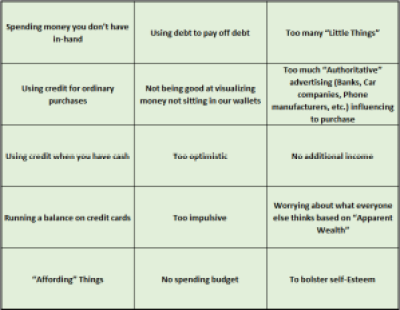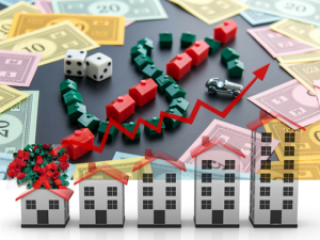 |
| Saving Money…Maybe you should think of it as Rescuing Your Money! |

Things I Think About
 |
| Saving Money…Maybe you should think of it as Rescuing Your Money! |
 |
| “The break-even point (BEP) in economics, business—and specifically cost accounting—is the point at which total cost and total revenue are equal.” |
This week’s topic is knowing your costs for your business or the Break-Even Point (BEP).
Before starting a business (or buying one), you should understand what your Break Even Point is. The BEP is where you have enough revenue coming in to cover all of your expenses. It means $0 in profit, but also that all expenses are covered.
Knowing what your BEP is can be beneficial in evaluating how much of your product or service you will have to sell to begin generating profit. It is always better to have this information before engaging in a business rather than trying to figure it out after you are already involved.
Direct Expenses
When determining the BEP, there are some differences between how to calculate this information for a Service Business and a Manufactured Products Business.
The next step is to gather all of your indirect expenses. This can include rent, utilities, sales, and distribution expenses. Anything that is not directly involved in the provision of a service or the manufacturing of a product.
Once you have all of your numbers, you can calculate your BEP.
For Service Businesses, your BEP is the sum of your direct and indirect expenses. If you bring in enough revenue to cover just those expenses, you have broken even.
For Manufactured Products Businesses, you simply divide your indirect expenses by your GP % to arrive at your BEP.
Example: Indirect Costs: $20,000; GP: 31%; $20,000/0.31= $64,516.13
As I stated above, it is a good idea to have this information before you are involved in a business. Once you understand where you stand with reference to a BEP, you can start to work on optimizing you costs & methodologies to increase efficiencies, lower costs, and lower the overall BEP for that business.
And, as always, let me know what you think in the comments. Ask questions, tell your story.
If you like my posts, please share them with others and subscribe to this blog.
 |
This week, we are going to talk about spending, spending habits, and debt. As I related in a couple of previous posts, My History With Money, Pt. I & My History With Money, Pt. II, I had a bit of a spending problem. While the majority of my debt was from my mortgage, I was having trouble keeping up with payments and just keeping cash on hand. Hopefully, I will be able to provide you with some insight into why we spend and get into debt.
First, here are some statistics I gathered on income and spending in the US:
The problem with averages is that it smooths out all of the variations in the data. In simpler terms, not everybody can recognize that excess money at the end of the year.
Here’s another bothersome statistic: 43% of Americans in the US spend more money than they make, according to the Federal Reserve.
 |
| The most common reasons people spend more than they make. |
How to address the reasons listed above
If you are in the situation where you are spending more than you make and/or are in a lot of debt, the first thing to do is commit to changing your habits and then doing some things to change your situation.
Budgeting:
Be aware of what money you have coming in and what money you are spending. Break out your spending between necessities and discretionary. Necessities are electricity, water, gas, mortgage/rent, food, transportation. Discretionary spending covers items like cell phones for every member of the family, cable, internet, visits to the casino, cigarettes, beer, and similar things that are not vital to your survival.
Figure out approximately what percentage of your monthly income is needed to cover each necessity and allocate a little more than that requirement to be put aside to cover each one. I suggest putting cash into envelopes labeled for each one. By putting a little more into the envelope, that will help to cover variances in income and costs. This idea is actually based on the ideas put forth in the book Profit First by Mike Michalowicz. The book is aimed at entrepreneurs trying to get their business to a profitable state, but the principles apply to personal finance, also.
They KEY thing is to not touch the money once you put it aside unless you are paying the bill it is dedicated to.
Make sure you are also able to put aside an emergency fund. The amount should be approximately three times your monthly income/take home pay. This goes a long way towards keeping your life steady in the event of bad weather, vehicle breakdown, illness, etc.
Try to stick to only spending on necessities until you are comfortably out of debt. Then start looking for ways to invest some of your “profit” to make you more money. (Since I am not a financial advisor, I can’t offer advice on how to invest that money, but I will cover my thoughts on the matter in a future post.)
Credit cards:
Only use them if you have the money to pay for what you are purchasing and can commit yourself to not spending the cash on anything other than paying your credit card bill. If you have a balance on your credit card, don’t use it at all until the balance is paid off. Only then should you use a credit card to buy stuff.
If you already have a balance on your credit card or even multiple cards, work on paying off those balances first. There are two approaches to methodology when doing this, either start paying extra on the card with the highest interest rate and balance, if you can make yourself do that regularly without getting disappointed or pick a card with the smallest balance and pay it off first. This will give you a self-esteem boost by way of accomplishment.
DON’T PUT ANYTHING ELSE ON THAT CARD!
After the first one is paid off, take the monthly allotment of your income that was dedicated to paying off that card and start adding it to what you are paying on the next card. Keep doing that until all of your cards are paid off.
PAY OFF YOUR BALANCE EVERY MONTH!
This is crucial for not accumulating debt. It may even be better for you to have a charge card like American Express, where you are required to pay it off every month.
Don’t “float” your balance from one new card to another without paying it off. It ends badly.
Psychological Reasons for Spending
We are constantly being bombarded with advertising trying to influence us to spend money. Whether it is buy a new car, get the latest phone, or use our credit card to buy your dreams. Advertising implies that if we don’t spend, we are a lesser person. Don’t believe it!
Yes, you do need some of the things you see advertised, but you don’t need to go broke or get in debt to get it.
Buying things to feel better about yourself actually make you feel worse in the long run.
DO something to change the things in your life you don’t like. Don’t waste time worrying about the things you can’t change, because it will only make you feel worse.
And, as always, let me know what you think in the comments. Ask questions, tell your story.
If you like my posts, please share them with others and subscribe to this blog.
 |
| The bottom, so far, is still higher than where we were in November. |
There was a significant drop-off last week through yesterday in the US stock market. The possible good news is that after a few straight days of dropping, today it looks to be climbing again. And the markets seem to have only dropped to early December levels. It’s the market, that’s what it does.
The purpose of this post is to document an observation. My inbox is starting to fill up with email from various advisory services, both automated web-based and actual human-led “capital management” firms to plug their services in these “times of uncertainty”.
I get it. They are taking advantage of a marketing opportunity when a certain segment of the population in the US will get worried that their retirement or investment dollars could be at risk. It just seems a little icky.
\rant
 |
| Like the game Monopoly, you can grow your money with Real Estate. |
This week, we are going to talk about how we started investing in real estate. It wasn’t an overnight decision, or result, for that matter.
My first foray into real estate investing (REI) was to partner with one my uncles and my cousin (his son) to develop an RV park in the Port Fourchon area. It seemed like a great idea…lots of potential for revenue and extended development. And I knew nothing about evaluating the deal to see if it was going to be a money maker or not. I put up the money to initiate the lease of the land ($20,000) and we proceeded to get a loan from a local bank to develop the park. We had to get permits, evaluations, inspections, etc. The total amount from the bank came to $150,000. Just as the park was about to open, the BP Macondo/Deepwater Horizon oil spill happened and shut down the oil & gas industry in the Gulf of Mexico. The space was leased to a catering company as a staging area for feeding spill cleanup workers and to facilitate a training space.
We eventually opened up the park and began operating. My cousin and his wife managed the operations.
I began traveling around the world a good bit for work and realized that I could not be deeply involved in the deal in addition to my wife not being happy with me involving us in it in the first place. My cousin offered to buy us out for $30,000, paid over time. This worked for us as it got our money back, along with about a 17% total ROI.
While the deal made us money, the stress and aggravation of not being in control left us with a bad taste in our mouths.
Fast forward a couple of years and we decided to remodel my in-laws’ home to set up as a rental. My father-in-law passed away the preceding year, leaving the home to my wife. We got it remodeled after a few false starts and bumps in the road. And started renting it out.
I mostly stayed hands-off of the operations and mainly just helped handle repairs & stuff, since it was my wife’s house (via inheritance).
Towards the end of 2015, I started to get aggravated with my job, (for the nth time), and started a more serious search for something else that I could rely on for income. In January of 2016, I found Bigger Pockets, an online forum/educational platform for real estate investors. It was then that I realized that REI was something that I could do. In fact, in a way, we were already doing it. The thing that appealed to me about it was that successful investors rely on systems and processes to make their businesses run well. WOW! I am a “Systems & Processes” type of guy! It was an epiphany, of sorts.
I started listening to podcasts, devouring forum posts related to my topics of interest, attending real estate investor association meetings, and reading books to learn about how to reach my financial goals through REI. I put together a 30,000 foot overview of what I would like to do and how I could do it. When I discussed my idea with my wife, she was initially skeptical because I repeatedly come up with plans to make money and either never initiate them or follow through on them.
I continued to learn about buying and managing rental properties, along with operating a business. I became more involved in the operation of the existing rental, more or less making it my responsibility.
So, that is how we got started in REI.
Let me know what you think in the comments. Ask questions, tell your story.
If you like my posts, please share them with others and subscribe to this blog.
 |
| What I grew up seeing around me. |
 |
| What I wanted to do. |
Today I am going to relate my experiences with Money from when I was a child to present day, in a loose chronological order.
My parents split up when I was approximately 10 years old and I don’t really remember a whole lot about our finances prior to that. What I do remember is that after that point, things were not easy.
We moved in with my grandparents, away from friends and family, started a new school, and began a different life. At the end of that school year, I began an unwanted tradition of working every summer on one of my grandfather’s shrimp boats and later in my uncles’ seafood businesses. Whatever money was earned went to help cover costs for my mother, my sister, and me to survive. I would get a hundred dollars at the end of the summer to buy school clothes for the upcoming year and that was the about all I would see of what I made.
My cousins of a similar age were doing the same work as me, but they got to keep all of their money, spending it on nice stereos, toys, etc., because their parents were making money and running a business.
I started learning about the businesses because it seemed like the way to not be poor. What I learned, besides the mechanics of actual operations, were bad money management habits.
Things seemed to be all about making sure you got your share out of the revenue, to the detriment of everything else…spending the holidays at hunting camps, spending the last bit of money you have, with no guarantee of future revenue.
This is not a good model to follow, especially if you are trying to maintain a steady income, much less, grow your income. Eventually, within a few years, both uncles were out of money, with no business to support them, because they only focused on the “right now” and had trouble planning for the long haul.
The takeaway lesson from today’s post is to not spend everything you make. Practice restraint and plan for the future. Short of winning the lottery like a former co-worker, you will not get rich quick. BUT, if you practice this as a habit, it should allow you to prepare for retirement.
Let me know what you think in the comments. Ask questions, tell your story.
If you like my posts, please share them with others and subscribe to this blog.
If you do not know me already, my name is Clint Galliano. I live in Louisiana and have worked in the oil and gas industry for most of my career. But I also do other “stuff”. In addition to working in O & G, my wife and I invest in real estate and invested a door manufacturing business, which I sit on the board of.
I started this new blog because I wanted to start posting content mainly not related to my OFTAS Blog (Oilfield, Tech, And Stuff), and leaning more towards finance, business, and investing.
In addition, one of my partners challenged me to write more in 2018. I take it as a growth opportunity.
While 2017 was interesting for me and my family, I am ready to plow into 2018 and grow as a person and as an investor. I am going to set a goal of writing a post a week on this blog, minimum, for the whole year. I may post more, depending on current events.
Below is the list of topics I plan to cover: